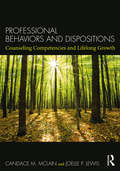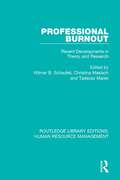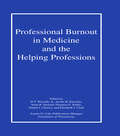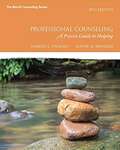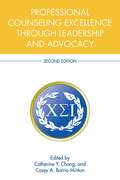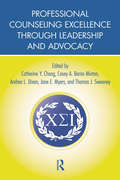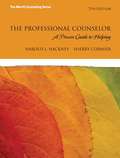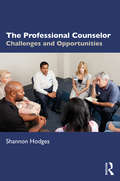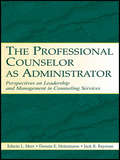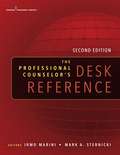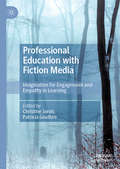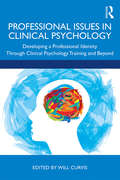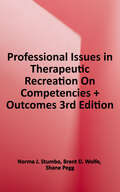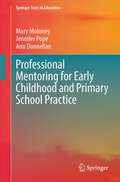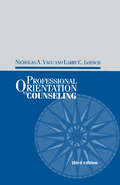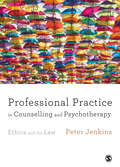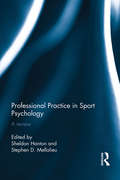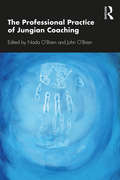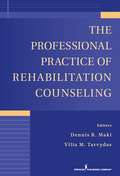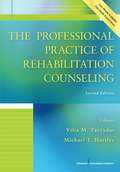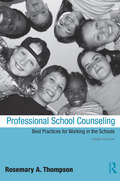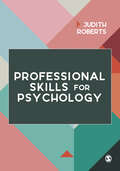- Table View
- List View
Professional Behaviors and Dispositions: Counseling Competencies and Lifelong Growth
by Candace M. McLain Joelle P. LewisProfessional Behaviors and Dispositions teaches counselors in training (CITs) how to cultivate counselor competencies and critical thinking skills in support of lifelong professional development. CITs will first gain a detailed understanding of the professional behaviors and dispositions expected of all counselors. They will then learn how to evaluate themselves for these factors using a universal growth model that promotes holistic, ongoing assessment of oneself and one’s relationships. Next, CITs will be presented with concrete tools and activities that they can use to cultivate and retain counselor competencies. Finally, CITs are given a step-by-step guide for creating a professional growth plan they can use throughout their program and their clinical practice. Accompanying this text is a helpful online faculty guide for supervisors to use while working with CITs. Aligned with CACREP, ACA, and ACES standards, this textbook will be useful for all graduate students training to become counselors.
Professional Burnout: Recent Developments in Theory and Research (Routledge Library Editions: Human Resource Management)
by Wilmar B. Schaufeli Christina Maslach Tadeusz MarekA rapidly growing number of people experience psychological strain at their workplace. In almost all industrialized countries, absenteeism and turnover rates increase, and an increasing amount of workers receive disablement benefits because of psychological problems. This book, first published in 1993, concentrates on a specific kind of occupational stress: burnout, the depletion of energy resources as a result of continuous emotional demands of the job. This volume presents theoretical perspectives that had been developed in the United States and Europe, discusses methodological issues, and examines organisational contexts. Written by an international group of leading scholars, this book will be of interest to students of both psychology and human resource management.
Professional Burnout in Medicine and the Helping Professions
by Jr. Austin H. Kutscher Elizabeth J. Clark Florence E. Selder D. T. Wessells Irene B. Seeland Daniel J. ChericoPhysicians and other helping professionals have created a practical, hands-on book that will aid in the identification and reduction of job stress. Nurses, physicians, thanatologists, and psychotherapists are among the growing number of health care professionals whose physical and mental health are being severely affected by work stress. This unique volume achieves what no earlier book has attempted for this specialized professional group. It offers a thorough understanding of professional burnout, elaborating how burnout develops and offering a model with which to identify job stressors. Professional Burnout in Medicine and the Helping Professions also offers an in-depth exploration of stress and burnout issues from the perspectives of specific medical and helping profession disciplines--physicians, nurses, social workers, psychotherapists, teachers, consultants, agency and hospital workers, funeral directors, and more.Experts in these fields examine the values, ethics, and morality of individuals, health care organizations, and society that may lead to burnout This in-depth and highly practical volume identifies the stages of disillusionment and offers successful intervention strategies for recognizing the signs and reducing or efficiently managing causative factors.
Professional Counseling: A Process Guide to Helping
by Harold Hackney Janine BernardThis package includes the bound book and MyCounselingLab® with Pearson eText. Bridging the gap between theory and practice, Hackney and Bernard’s The Professional Counselor offers a solid grounding in counseling skills and an understanding of how these skills are used within different therapy orientations, including affective, cognitive, behavioral, and systemic domains. It presents students with a four-stage model of counseling which shows them how to assess client problems, develop counseling goals, define strategies and select interventions, and terminate and evaluate the counseling relationship. The new co-author of this edition, Janine M. Bernard, brings her expertise in clinical supervision to help deconstruct the counseling process for learners, resulting in effective editing of all chapters in this edition. Also included is a discussion of the application of counseling interventions to Dialectical Behavior Therapy and Motivation Interviewing, so that students can appreciate that skills are not distinct from therapy approaches they will use in their clinical courses. Included are new case examples drawing from different specialties within counseling, and more than 40 new web-based video samples illustrating the content of the book.
Professional Counseling Excellence through Leadership and Advocacy
by Catherine Y. ChangProfessional Counseling Excellence through Leadership and Advocacy provides readers with the knowledge, skills, and qualities to succeed as leaders and advocates throughout their careers. Edited by leaders in counselor education and endorsed by Chi Sigma Iota, this text places leadership and advocacy in a historical context while strengthening the foundational knowledge and skills counselors need. The new edition integrates the Multicultural and Social Justice Counseling Competencies (MSJCCs) and applies them to a variety of counseling settings at both local and state levels. Chapters also address leadership and design of effective counselor education programs, curricular implications, supervision and consultation, and research directions. The new edition is designed for counselor educators and supervisors and doctoral-level counselor education students who are studying leadership and advocacy as one of five core areas within the 2016 CACREP standards and for master’s level students and practitioners who are growing their leadership and advocacy skills.
Professional Counseling Excellence through Leadership and Advocacy
by Catherine Y. Chang Casey A. Barrio Minton Andrea L. Dixon Jane E. Myers Thomas J. SweeneyThis text will be a valuable resource for counseling students and educators to assist in the incorporation of leadership and advocacy training into the counseling curriculum, based on the new standards set forth by the Council for Accreditation of Counseling and Related Educational Programs (CACREP). Readers will acquire a broad scope and vision of leadership and advocacy which includes client advocacy, advocacy for the counseling profession, and social justice. It identifies the historical context of leadership and advocacy, provides a framework from which to understand these concepts, and provides concrete examples of leadership and advocacy happening in the field today. Chapters describe the design of an effective counselor education curriculum, supervision of counselors, and leadership and advocacy practice in various counseling settings. Edited by leaders in the field of counselor education and endorsed by Chi Sigma Iota, this text will provide students with the knowledge, skills, and qualities to succeed as leaders and advocates throughout their counseling careers.
The Professional Counselor: A Process Guide To Helping
by Harold Hackney Sherry CormierStudents and beginning counselors can turn to this helpful guide to get the concepts, techniques, interventions, strategies, and skills they achieve effective results with their clients. Every step of the counseling process is covered, from initial client contact to relationship building, assessment, goal setting strategy selection, treatment planning, and finally evaluation and termination.
The Professional Counselor: Challenges and Opportunities
by Shannon HodgesThe Professional Counselor: Challenges and Opportunities weaves a rich narrative for the inner counselor of self-discovery, mindfulness and self-care, emotional intelligence, counselor identity, ethical issues, career maturation, and future trends in counseling. Readers will be confronted with professional decision points regarding enrollment in the counselor profession, ethical issues, client treatment, accreditation, and occupational outlook. The text also posits counseling as an emerging global profession and addresses the ways technology will transform professional practice. Each chapter concludes with a Lessons Learned section in which the author uses his personal and professional experiences to address relevant professional issues in mindfulness-based treatment. The Professional Counselor is an excellent resource and guide for students in graduate counseling programs, those considering the field, and counselors new to the profession.
The Professional Counselor as Administrator: Perspectives on Leadership and Management of Counseling Services Across Settings
by Edwin L. Herr Dennis E. Heitzmann Jack R. RaymanA largely undiscussed problem exists in the counseling community. Each year many excellent professional counselors with little or no administrative preparation or leadership experience are asked to assume administrative roles in schools, colleges and universities, state and federal government offices, community agencies, and foundations. The purpose of this book is to lighten their challenge by providing them with knowledge of the basic tasks and tools needed by a professional administrator and, equally important, how to adapt those tasks and tools to various professional settings. Key features of this outstanding new book include the following:*General Skills -- Chapters 1 and 2 address the meanings of the terms leadership, management and administration, examine the tasks associated with each term, and provide the concepts and skills (e.g., strategic planning, budgeting, recruitment and development of staff, use of technology, etc.) needed by any counseling administrator in any setting.*Applications -- Chapters 3-9 examine the similarities and differences in counseling leadership and management in different settings. The point is made that counseling services are rarely stand-alone structures; typically they are part of larger institutions to which they must demonstrate their contribution. No other book examines how counseling services are adapted to different settings.*Expertise -- Written by three professional counselors who collectively have more than 90 years of administrative experience, this book supplements existing research and scholarship with a wealth of personal experience -- especially on those topics where the published literature is thin.This book is appropriate for the following audiences: 1) graduate students in counselor education or counseling psychology who aspire to leadership positions; 2) practicing counselors entering (or those new to) administrative positions; 3) practicing counselors seeking to understand the institutional settings in which they practice; and 4) counseling administrators seeking an easy-to-use reference volume.
The Professional Counselor's Desk Reference (Second Edition)
by Irmo Marini Mark A. StebnickiWithout a doubt, many practitioners, students, supervisors, counselor educators, and researchers will treasure this unique handbook that contains a wealth of information on a variety of topical areas, some of which include professional identity, ethical and professional issues, case management and consultation, multicultural counseling issues, counseling theories and techniques, career counseling across the life span, assessment and diagnosis, counseling couples and families, disability-affirmative counseling, counseling diverse client populations, and contemporary issues in counseling.
Professional Education with Fiction Media: Imagination for Engagement and Empathy in Learning
by Christine Jarvis Patricia GouthroThis book analyses how narrative fictions can be used by faculty and staff in the teaching of professionals in higher education. As professional life becomes ever more demanding, this book draws together the work of researchers and practitioners who have explored the tremendous impact that narrative fictions – novels, short stories, drama and poetry – can have on development. The editors and contributors posit that fiction can help professionals imagine new ways of being, reinvent their roles and tackle problems without a road map. Using fiction can also provide a safe place for the exploration of ethics and decision making, as well as furnishing tools for the development of empathy and engagement by offering vicarious experiences of drastically different lives and situations. A medium that by its very nature contains a multiplicity of interpretations, using fiction in professional education can enhance the education of professionals working in a range of disciplines, including health, education, social care, law and science.
Professional Ethics for School Psychologists A Problem-solving Model Casebook
by National Association of School PsychologistsStrengthen your professional ethical identity with the newest edition of Professional Ethics for School Psychologists. This resource helps you effectively interpret and put into practice the field's ethical principles. With over 150 real and fictional cases, you'll increase your ability to navigate through competing ethical principles and conflicting interests.
Professional Issues in Clinical Psychology: Developing a Professional Identity through Training and Beyond
by Will CurvisProfessional Issues in Clinical Psychology: Developing a Professional Identity through Training and Beyond offers insights from a range of trainee, recently qualified and experienced clinical psychologists as they reflect on the process of developing their professional identity through consideration of dilemmas and issues they experienced through clinical psychology training. Reflecting the breadth of the profession and the range of services in which clinical psychologists work, the chapters highlight the different types of roles that clinical psychologists are expected to undertake throughout training and post-qualification. The book provides practical clinical recommendations that can be applied in work settings in line with contemporary research, policy and guidance, as well as personal reflections from the authors on how managing professional issues has shaped their practice as a developing clinical psychologist. Developing a professional identity as a clinical psychologist is vital in learning to navigate these challenges. The process by which a professional identity develops is an individual journey. However, Professional Issues in Clinical Psychology offers aspiring, trainee or qualified clinical psychologists - and other healthcare professionals - with a contemporary resource around professional issues which might be encountered within clinical psychology practice.
Professional Issues in Therapeutic Recreation: On Competencies and Outcomes
by Norma J. Stumbo Brent D. Wolfe Shane PeggThe latest edition of Professional Issues in Therapeutic Recreation On Competence and Outcomes recognizes that the profession must continue to challenge the status quo and one another. Issues and ideas are not stagnant; they are forever changing, and the various sections and chapters of this edition will challenge the reader to conceptualize ideas from new perspectives and in a new light. Readers are encouraged to wrestle with the ideas presented. Do not simply read them and file the information away. Interact with the ideas. Discuss the ideas. Argue about the ideas. Whatever you do, do not simply disregard an idea because it represents a viewpoint or perspective that is different from your personal philosophy related to the profession. We challenge all readers to be drawn into the variety of topics, concepts, and perspectives presented in this volume so each can continue to personally grow and enable the profession to continue to grow. Like the first two editions, this effort has four major sections: Introduction, Education, Practice, and Research. It is clear that these divisions are largely arbitrary, as every practice issue affects every research issue, every education issue affects every practice issue, and on and on. However, books require an organizational layout, and these divisions appear to make sense. Each section begins with a Keynote chapter aimed at setting the stage for that particular section. Each section also ends with a Perspective chapter, largely an opinion or viewpoint piece to encourage readers to continue discussion on related issues.
Professional Mentoring for Early Childhood and Primary School Practice (Springer Texts in Education)
by Mary Moloney Jennifer Pope Ann DonnellanInformed by current theory and practice, this book adapts a practical approach to mentoring that is grounded in real life experiences. Written in an accessible style, it explores the key concepts, characteristics and considerations of mentoring and mentoring relationships in early childhood and primary education contexts. With a focus upon mentoring as it applies to practicum during initial teacher education, as well as teacher induction, different models and approaches to mentoring, including dyads, triads, peer mentoring, critical friends and communities of practice (CoP) are introduced and evaluated. Engaging with theory, practical scenarios, key learning and reflection points throughout, the book invites the reader to reflect on the mentoring process from different perspectives to build the critical skills required by mentors and mentees alike, to create or enhance a culture of mentoring within their organisation. Written from the perspective of both mentors and mentees, the book is a valuable resource for those in the Further and Higher education sectors, as well as early childhood and school-based mentors. It is relevant to experienced mentors, who may wish to affirm their existing approach to mentoring, or want to explore, discover and embrace new and improved ways of working with a mentee. This book is also essential reading for anyone interested in mentoring, providing a wealth of information, insights and effective strategies for those who may be thinking of undertaking a mentoring role.
Professional Orientation to Counseling
by Nicholas Vacc Larry C. LoeschFirst published in 2001. Routledge is an imprint of Taylor & Francis, an informa company.
Professional Practice in Counselling and Psychotherapy: Ethics and the Law
by Peter JenkinsDeveloping and maintaining a secure framework for professional practice is a core part of any counselling and psychotherapy training, as all therapists need to understand the key values, ethics and laws that underpin the profession today. But what does being a member of a 'profession’ actually mean, and what does being a ‘professional’ actually involve? Structured around the BACP Core Curriculum, and with the help of exercises, case studies and tips for further reading, this book covers everything from the requirements of the BACP Ethical Framework to broader perspectives on good professional practice. It includes: Practising as a therapist in different roles and organizational contexts. Working with key issues, including difference, vulnerable clients and risk. Understanding the law and relevant legal frameworks for practice. Working ethically, including contrasting models and approaches to ethics.
Professional Practice in Counselling and Psychotherapy: Ethics and the Law
by Peter JenkinsDeveloping and maintaining a secure framework for professional practice is a core part of any counselling and psychotherapy training, as all therapists need to understand the key values, ethics and laws that underpin the profession today. But what does being a member of a 'profession’ actually mean, and what does being a ‘professional’ actually involve? Structured around the BACP Core Curriculum, and with the help of exercises, case studies and tips for further reading, this book covers everything from the requirements of the BACP Ethical Framework to broader perspectives on good professional practice. It includes: Practising as a therapist in different roles and organizational contexts. Working with key issues, including difference, vulnerable clients and risk. Understanding the law and relevant legal frameworks for practice. Working ethically, including contrasting models and approaches to ethics.
Professional Practice in Sport Psychology: A review
by Sheldon Hanton Stephen D. MellalieuSport psychologists working with athletes, teams and sports performers are only as effective as their professional techniques and competencies will allow. This is the first book to offer a detailed and critical appraisal of the conceptual foundations of contemporary professional practice in sport psychology. The book presents a series of reviews of the most up-to-date academic and professional literature on professional practice, exploring issues that all psychologists face when working with clients in sport and offers important evidence-based recommendations for best practice. Key topics covered include: models of practice and service delivery counselling and clinical intervention working with teams working with young performers providing life skills training managing career transitions working with special populations enhancing coach-athlete relations. With contributions from leading sport psychology consultants in the UK, the US, Canada, Australia and continental Europe, this is a comprehensive and thought-provoking resource that bridges the gap between research and application. It is vital reading for all advanced students, researchers and professionals working in sport psychology.
The Professional Practice of Jungian Coaching: Corporate Analytical Psychology
by Nada O’BrienO’Brien and O’Brien and their collection of international contributors introduce the historical and current theory and practice of Corporate Analytical Psychology. Uniquely and practically bringing Jungian ideas to the corporate world, the chapters discuss the increasing need for ethical corporations in the context of individuation and moral hazard, demonstrate how to manage and define complexes that inhibit creativity and productivity, and shows practitioners how to recognise and connect with symbols as an active and living manifestation of the personal and collective psyche. The book is illustrated with practical examples and case studies encountered by the authors during their 30 years of experience consulting the world’s leading companies and institutions.
The Professional Practice of Rehabilitation Counseling (Second Edition)
by Dennis R. Maki Vilia M. TarvydasBased on the "Handbook of Rehabilitation Counseling" (Rigger/Maki 2004), this new volume has been completely revised and updated to accommodate the overarching changes that have recently occurred in the field. It reflects the new, accepted definition of rehabilitation counseling as a specialization "within" the field of counseling and demonstrates how the knowledge, skills and attitudes of rehabilitation counseling complement those of mental health counseling. The volume now includes an increased emphasis on education in general counseling, and mental health and substance abuse counseling; empirically supported practice; and a focus on the globalization of professional practice in rehabilitation counseling. It has been organized within a new conceptual framework for ease of use, and is based on the authors' ecological model that is a core framework for the book and the field itself. Key Features: Places rehabilitation counseling firmly within the profession of counseling Imparts the essence of the transformative rehabilitation practice Compatible with both CORE and CACREP standards for basic professional identity content Authored by nationally recognized experts in specialized topics who are acknowledge leaders in their field Designed for the practical use of students and instructors of introductory courses, as well as practicing professionals New to This Edition: Learning objectives for each chapter Content review and discussion questions for each chapter to enhance active learning PowerPoint presentations for instructors' use Model syllabus for an introduction to rehabilitation counseling course for instructors Exhaustive in scope, "The Professional Practice of Rehabilitation Counseling" will provide the expertise necessary for new graduates and practicing professionals who need to gain licensure and employment opportunities.
The Professional Practice of Rehabilitation Counseling (Second Edition)
by Vilia Tarvydas Michael T. HartleyRevised to reflect radical changes in the field and their impact on professional practice Now updated and substantially revised to reflect the CORE/CACREP merger and fundamental changes in the field, this comprehensive graduate-level second edition textbook articulates the complementary relationship between rehabilitation and mental health counseling and how it impacts professional practice. New information is introduced to address the increasing diversity of current and emerging job titles, duties, and settings, as well as to reframe existing content to better prepare rehabilitation counselors for navigating a continually shifting health care system. The second edition defines rehabilitation counseling as a specialty area of the broader counseling profession, and introduces psychiatric rehabilitation as a bridge to understanding the intersection of traditional rehabilitation and mental health counseling. It emphasizes recovery-based models and describes evidence-based research supporting the effectiveness of psychosocial interventions. Esteemed experts also address specific job functions related to assessment, credentialing, counseling, case management, advocacy, and career development. Four completely new chapters cover the fundamental concepts and models that underpin rehabilitation counseling, the evidence-based competencies that constitute rehabilitation counseling practice, and the specialized practices of forensic rehabilitation, and psychiatric rehabilitation. New and Key Features Reflects the CORE/CACREP merger and its impact upon rehabilitation counseling Conceptualizes rehabilitation counseling and its complementary relationship to counseling Includes new chapters on fundamental elements of rehabilitation counseling practice and on specialized practice in forensic and psychiatric rehabilitation. Addresses changes to CRCC 2016 Code of Ethics Covers the infusion of technology into distance education and counseling Laces a global perspective throughout with an emphasis on the ICF model Reflects the reality of professional practice in the current job market Includes new activities to enhance learning Offers an Instructors Manual with test item bank, Power Point presentations, and learning activities on applying chapter content Provides a model syllabus for Introduction to Rehabilitation Counseling
Professional School Counseling: Best Practices for Working in the Schools, Third Edition
by Rosemary A Thompson Dr. Rosemary ThompsonToday’s children and adolescents are constantly facing new and unique challenges, and school counselors must respond to this by expanding their role and function within the schools. This revised and expanded edition of Thompson’s important text explores these issues, as well as the necessary steps school counselors need to take in order to adapt and effectively deal with them. Thompson advocates for the need for standards-based school counseling, outlining the framework and benefits of the ASCA National Model® and comprehensive guidance and counseling programs. She addresses the newest research in implementing evidence-based practices; the mental health issues that may be faced by children and adolescents; consulting with teachers, parents, administrators, and the community; and crisis intervention and management. New to this edition are chapters that focus on minority and disenfracnshised students and emphasize the need for school counselors to be able to advocate, coordinate, and collaborate on services for these students and their families. This is an essential resource for every school counselor in a time when the profession is becoming increasingly important.
Professional Skills for Psychology
by Judith RobertsProfessional Skills for Psychology covers key professional, ethical and career development issues. Whether you′re a student or a professional, this book provides you with a thorough grounding in how to develop a successful career in psychology. Written by the module leader of ‘Professional Skills in Psychology’ at Bangor University, and with a strong focus on practical skills, each chapter includes case studies with a range of scenarios, allowing you to consolidate the key points covered. From leadership to working in teams, and from equality and diversity to practitioner resilience, this book is essential reading for anyone considering a career in practitioner psychology, or for practitioners seeking to nurture their skills. Judith Roberts is a HCPC registered Clinical Psychologist with over 20 years’ experience of working in Health and Social Care.
Professional Skills for Psychology
by Judith RobertsProfessional Skills for Psychology covers key professional, ethical and career development issues. Whether you′re a student or a professional, this book provides you with a thorough grounding in how to develop a successful career in psychology. Written by the module leader of ‘Professional Skills in Psychology’ at Bangor University, and with a strong focus on practical skills, each chapter includes case studies with a range of scenarios, allowing you to consolidate the key points covered. From leadership to working in teams, and from equality and diversity to practitioner resilience, this book is essential reading for anyone considering a career in practitioner psychology, or for practitioners seeking to nurture their skills. Judith Roberts is a HCPC registered Clinical Psychologist with over 20 years’ experience of working in Health and Social Care.
